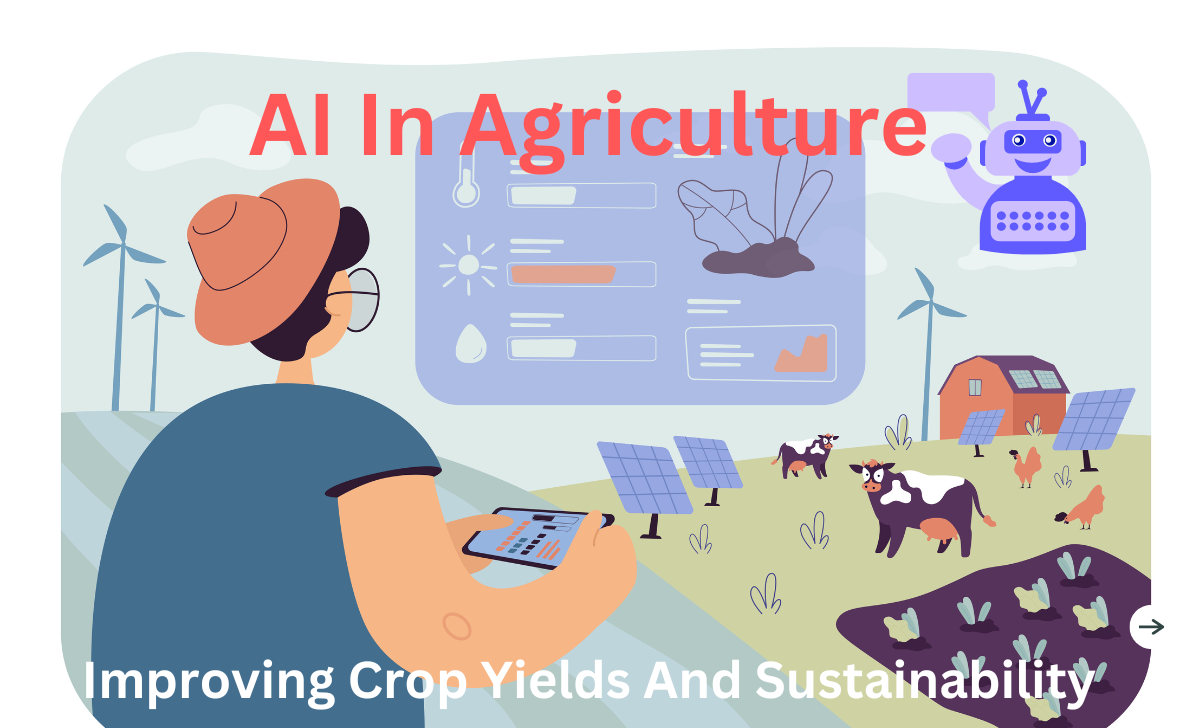|
Listen Now Our Blog Podcast
Getting your Trinity Audio player ready...
|
Overview of AI in Agriculture
Agriculture is a crucial sector for food production and economic growth. Over the years, technological advancements have helped improve crop yields and sustainability.
One such technology that is rapidly gaining popularity in the agricultural sector is Artificial Intelligence (AI).
AI has the potential to revolutionize agriculture by enhancing crop yields, reducing wastage, and ensuring sustainability.
AI-Powered Precision Agriculture
AI-powered precision agriculture involves using sensors, drones, and other technologies to collect data on soil conditions, weather patterns, and crop growth.
This data is then used to make precise decisions about planting, irrigation, and fertilization, leading to increased crop yields.
According to a report by MarketsandMarkets, the precision agriculture market is expected to reach $9.53 billion by 2025, growing at a CAGR of 12.7% between 2020 and 2025.
Soil Health Monitoring
Soil health is critical to crop growth and sustainability. AI-based soil health monitoring systems can analyze soil samples and provide information on the health of the soil, including nutrient levels, PH levels, and water holding capacity.
According to a report by Mordor Intelligence, the global soil monitoring market is expected to grow at a CAGR of 11.6% from 2020 to 2025.
Plant Disease Detection
Plant diseases can cause significant damage to crops, resulting in reduced yields and lower profits.
AI-based plant disease detection systems can identify conditions early on and help farmers take corrective measures.
According to a report by Zion Market Research, the global market for plant disease detection systems is expected to reach $3.14 billion by 2025, growing at a CAGR of 7.6% from 2019 to 2025.
Yield Prediction
Predicting crop yields accurately is critical for farmers to plan their harvesting and sales strategies.
AI-based yield prediction systems can analyze data on weather patterns, soil health, and crop growth to predict yields accurately.
According to a report by Grand View Research, the global crop monitoring technology market is expected to reach $4.2 billion by 2027, growing at a CAGR of 12.5% from 2020 to 2027.
Crop Monitoring
Monitoring crop growth and development is crucial for farmers to identify potential problems and take corrective measures.
AI-based crop monitoring systems can analyze data on plant growth, weather patterns, and soil health to help farmers make informed decisions.
According to a report by MarketsandMarkets, the global crop monitoring market is expected to reach $4.6 billion by 2025, growing at a CAGR of 13.0% from 2020 to 2025.
Water Management
Water scarcity is a significant problem in many parts of the world, and efficient water management is critical for sustainable agriculture.
AI-based water management systems can analyze data on soil moisture levels, weather patterns, and crop water requirements to optimize irrigation and reduce water wastage.
According to a report by Allied Market Research, the global smart irrigation market is expected to reach $1.8 billion by 2026, growing at a CAGR of 16.6% from 2019 to 2026.
Crop Optimization
Crop optimization involves identifying the optimal crop growing conditions, including the right planting dates, irrigation levels, and fertilization requirements.
AI-based crop optimization systems can analyze data on soil health, weather patterns, and crop growth to identify the best practices for crop management, leading to increased yields and sustainability.
According to a report by ResearchAndMarkets, the global market for crop optimization technologies is expected to grow at a CAGR of 13.5% from 2020 to 2025.
Autonomous Machinery
Autonomous machineries such as tractors, harvesters, and drones are becoming increasingly popular in agriculture.
AI-based autonomous machinery can perform tasks such as planting, irrigation, and harvesting without human intervention, leading to increased efficiency and reduced labor costs.
According to a report by Tractica, the global market for agricultural robots is expected to reach $73.9 billion by 2024, growing at a CAGR of 24.6% from 2019 to 2024.
Predictive Analytics
Predictive analytics involves using AI to analyze data and predict future outcomes.
In agriculture, predictive analytics can help farmers make informed decisions about crop management, such as predicting crop yields, identifying potential problems, and optimizing resource allocation.
According to a report by MarketsandMarkets, the global predictive analytics market is expected to reach $10.95 billion by 2023, growing at a CAGR of 22.1% from 2017 to 2023.
Sustainable Agriculture
Sustainable agriculture involves using resources efficiently to ensure that the needs of the present are met without compromising the ability of future generations to meet their needs.
AI-based technologies such as precision agriculture, soil health monitoring, and water management can help promote sustainable agriculture by reducing wastage, increasing yields, and optimizing resource use.
According to a report by Allied Market Research, the global sustainable agriculture market is expected to reach $11.23 billion by 2026, growing at a CAGR of 9.5% from 2019 to 2026.
Disease And Pest Detection
AI-based technologies can help detect and identify plant diseases and pests early, allowing farmers to take proactive measures to prevent their spread and minimize crop losses.
According to a report by Grand View Research, the global market for AI in agriculture for disease detection is expected to reach $3.0 billion by 2025, growing at a CAGR of 23.0% from 2020 to 2025.
Climate Monitoring And Adaptation
Climate change is one of the biggest challenges facing agriculture today, with changing weather patterns affecting crop yields and sustainability.
AI-based technologies can help monitor weather patterns, predict climate change impacts, and develop adaptation strategies to mitigate the effects of climate change on agriculture.
According to a report by Zion Market Research, the global market for climate-smart agriculture is expected to reach $3.0 billion by 2026, growing at a CAGR of 13.5% from 2019 to 2026.
Crop Breeding And Genetic Engineering
AI-based technologies can help accelerate the process of crop breeding and genetic engineering by analyzing vast amounts of data and identifying traits that can improve crop yields, resistance to disease, and other desirable characteristics.
According to a report by MarketsandMarkets, the global market for AI in agriculture for crop breeding and genetic engineering is expected to reach $2.6 billion by 2025, growing at a CAGR of 28.4% from 2020 to 2025.
Supply Chain Optimization
AI-based technologies can help optimize the supply chain in agriculture, from farm to table.
By analyzing data on production, transportation, and distribution, AI can help reduce waste, increase efficiency, and ensure that food reaches consumers in a timely and cost-effective manner.
According to a report by Mordor Intelligence, the global market for AI in agriculture for supply chain optimization is expected to reach $1.5 billion by 2025, growing at a CAGR of 25.5% from 2020 to 2025.
Agricultural Finance And Insurance
AI-based technologies can help improve access to finance and insurance for farmers by providing more accurate risk assessments and reducing administrative costs.
AI can analyze data on weather patterns, crop yields, and other factors to help insurers develop customized insurance products and pricing models.
According to a report by PwC, the global market for AI in agriculture for finance and insurance is expected to reach $4.0 billion by 2026, growing at a CAGR of 25.3% from 2020 to 2026.
Conclusion
AI is revolutionizing the agricultural sector by improving crop yields and sustainability.
From precision agriculture to autonomous machinery, AI-based technologies are helping farmers make informed decisions and optimize resource use.
As the global population continues to grow, the demand for food is expected to increase, and AI-based technologies will play a crucial role in ensuring food security and sustainable agriculture.
AI in Agriculture FAQs
How AI Is Used In Agriculture?
AI is being used in agriculture in a variety of ways, such as precision farming, crop monitoring, yield prediction, and livestock management.
With the help of AI algorithms, farmers can gather and analyze vast amounts of data to make informed decisions that can improve crop yields, reduce waste, and increase efficiency.
What Are The 3 Most Popular Applications Of AI In Agriculture?
The three most popular applications of AI in agriculture are precision farming, crop monitoring, and yield prediction




